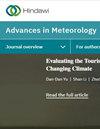Evaluation of Hydropower Generation and Reservoir Operation under Climate Change from Kesem Reservoir, Ethiopia
IF 2.1
4区 地球科学
Q3 METEOROLOGY & ATMOSPHERIC SCIENCES
引用次数: 4
Abstract
Climate changes significantly cause the precipitation deficiency and in turn reduce the inflow amount in reservoir affecting hydroelectric power generation. The primary objective of this study was to evaluate hydropower generation and reservoir operation under climate change from Kesem reservoir. Recent Representative Pathway (RCP) scenarios were used to evaluate the impact of climate change on power generation. Power transformation equation and variance scaling approach were amalgamated to adjust the bias correction of precipitation and temperature, respectively. Bias, root mean square error, and coefficient of variation were used to check the accuracy of projected rainfall. The base and future precipitation, temperature, and evaporation trend was analysed using the Mann–Kendall test. The flow calibration and validation were carried out by the Hydrologic Engineering Center-Hydrologic Modelling System (HEC-HMS), and hydropower generation was evaluated with reservoir simulation model (MODSIM 8.1) under climate scenarios. The performance of the model was found good with Nash–Sutcliffe coefficient (NSE) of 0.72 and coefficient of determination (R2) of 0.73 for calibration and NSE of 0.74 and R2 of 0.75 for validation. Projected future climate scenarios predicted increasing and decreasing trend of temperature and precipitation, respectively. For RCP4.5 climate scenario, the average energy generation is likely to decrease by 0.64% and 0.82% in both short-term (2021–2050) and long-term (2051–2080), respectively. In case of RCP8.5 climate scenario, the average energy generation will be decreased by 1.06% and 1.35% for short-term and long-term, respectively. Remarkable reduction of energy generation was revealed in RCP8.5 with relation to RCP4.5 scenario. This indicates that there will be high energy fluctuation and decreasing trend in the future energy generation. The research finding is crucial for decision-makers, power authorities, governmental and nongovernmental organizations, and watershed management agencies to take care for sustainability in the future hydropower generation in the Kesem reservoir.埃塞俄比亚Kesem水库气候变化下的水力发电和水库运行评价
气候变化显著导致降水不足,进而减少水库入水量,影响水力发电。本研究的主要目的是评估Kesem水库在气候变化下的水力发电和水库运行。最近的代表路径(RCP)情景用于评估气候变化对发电的影响。将幂变换方程和方差标度法相结合,分别调整降水和温度的偏差校正。偏差、均方根误差和变异系数用于检查预测降雨量的准确性。使用Mann-Kendall检验分析了基本和未来的降水、温度和蒸发趋势。流量校准和验证由水文工程中心水文建模系统(HEC-HMS)进行,水力发电由水库模拟模型(MODSIM 8.1)在气候情景下进行评估。该模型的性能良好,Nash–Sutcliffe系数(NSE)为0.72,确定系数(R2)为0.73用于校准,NSE为0.74,R2为0.75用于验证。预测的未来气候情景分别预测了气温和降水量的上升和下降趋势。对于RCP4.5气候情景,短期(2021-2050年)和长期(2051-2080年)的平均发电量可能分别下降0.64%和0.82%。在RCP8.5气候情景中,短期和长期的平均发电量将分别减少1.06%和1.35%。与RCP4.5场景相比,RCP8.5中的发电量显著减少。这表明未来能源发电将出现较高的能源波动和下降趋势。这一研究结果对于决策者、电力当局、政府和非政府组织以及流域管理机构关心凯塞姆水库未来水力发电的可持续性至关重要。
本文章由计算机程序翻译,如有差异,请以英文原文为准。
求助全文
约1分钟内获得全文
求助全文
来源期刊

Advances in Meteorology
地学天文-气象与大气科学
CiteScore
5.30
自引率
3.40%
发文量
80
审稿时长
>12 weeks
期刊介绍:
Advances in Meteorology is a peer-reviewed, Open Access journal that publishes original research articles as well as review articles in all areas of meteorology and climatology. Topics covered include, but are not limited to, forecasting techniques and applications, meteorological modeling, data analysis, atmospheric chemistry and physics, climate change, satellite meteorology, marine meteorology, and forest meteorology.
 求助内容:
求助内容: 应助结果提醒方式:
应助结果提醒方式:


